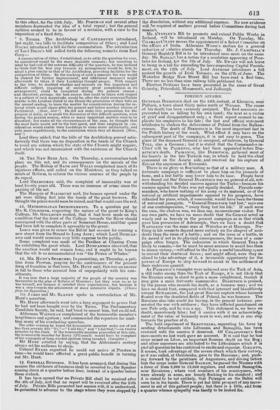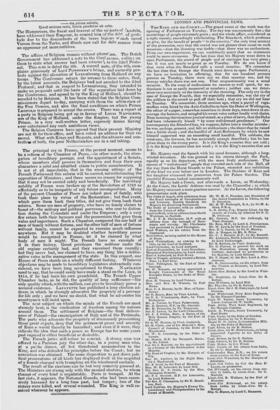FOREIGN AFFAIRS.
GENERAL DIEBITSCH died on the 10th instant, at Kleczeeo, near. Pultusk, a town about thirty miles north of Warsaw. The cause
of his death has been variously assigned. The first accounts re- presented him as falling by his own hand ; the next as a victim of grief and disappointment only ; a third report seemed to iiñ plicate his employers in his fate ; the last and official statement attributes to cholera the deliverance of Poland froth the Balkan-
crosser. The death of DIEBITSCH is the most important fact in the Polish history of the week. What effect it may have on the subsequent part of the campaign, it is not easy to guess. The place of the deceased General is occupied, ad interim, by General Tont., also a German ; but it is stated that the Commander-in- Chief will be PASKEWIC, who had been appointed before DIE-. BITSCH'S death. PASKEWIC, like DIEBITSCH, gathered robst of
his laurels in the late Turkish war, in which he held the chief command on the Asiatic side, and received for his capture of Erivan tile cognomen of Erivanski.
• There is no glory so fluctuating as that of a military man. A. fortunate campaign is sufficient to place him on the pinnacle of
fame, and a lost battle may lower him to its base. People have
now found out that General DIEBITSCH was no general at all, not- withstanding his decided success against the Turks—because his
success against the Poles was not equally decided. Fireside com- manders, who know nothing of his army or its materiel, or of the natural or artificial impediments opposed to his progress, have ridiculed his plans, which, if successful, would have been the theme
of universal panegyric. " General DIEBITSCH had lost," says one of our contemporaries, "every thing but his life." If such were
the case, the cholera was, we dare say, no unwelcome visitor. For our own parts, we have no more doubt that the General acted as wisely and as bravely in the present campaign as in that which gave him possession of Adrianople, than we have a doubt that
NAPOLEON was the same man at Waterloo as at Marengo. No- thing in life seemSto depend more entirely on the chapter of acci-
dents than the issue of a battle ; and on the issue of a battle, in its moral if not in its physical consequences, the issue of a cam- paign often hinges. The indecision in which General Toni. is likely to remain,—for he must be more anxious to avoid loss than to insure victory,—will afford to the Poles a useful breathing space to recruit their shattered forces ; and might afford, were they in- clined to take advantage of it, a favourable opportunity for the powers of Europe to step forward to assist in the settlement of their righteous quarrel. • As PAsazwic's triumphs were achieved over the Turk of Asia, a still ruder enemy than the Turk of Europe, it is not likely that the Russian army is about to gain a more enlightened, though it
'may gain a more fortunate commander. DIEBITSCH is praised, by the person who records his death, as a humane man ; and we
have no doubt that, compared with that ignorant and bloodthirsty
savage SuwAnnow, the last great Russian captain whose banners floated over the desolated fields of Poland, he was humane. The
Russians also take credit for having, in the present instance, pro- secuted the war with mildness ; they have inflicted punishment on one Pole only, and he was a spy. This statement is, we have no
doubt, monstrously false ; but it carries with it an acknowledg.7 ment of the value of humanity even in war, and that is one step towards the practice of it. The bold experiment of SKRZYNECKI, separating his force by sending detachments into Lithuania and SamOtia, has been crowned with the success it deserved. Of CHLAPOWSKI'S first movements we last week gave an account. It is said that he has since seized on Litow, an important Russian depot on the Bug; and other successes are attributed to the Lithuanians which it is past all question he has contrived to excite and organize. GIELGUD; it seems, took advantage of the severe check which their victory, as it was called, at Ostrolenka, gave to the Russians ; and, push- ing forward by the palatinate of Angustowo, and driving before him the corps under General SACKEN, he passed the Niemen with a force of from 9,000 to 12,000 regulars, and entered Samogitia, near Rossienna ; where vast numbers of his countrymen, ,who were already in arms, are hourly flocking to his standard ; and it is stated to be not unlikely, that Po;angen on the Baltic will soon be in, his hands. There is yet but little prospect of any move- ment in aid of this gallant people ; but there is a little, and from a quarter whence sympathy was hardly to be looked for.
— via prima salutis, Quod minime reris, Graia pandetur ab urbe.
The Hungarians, the freest and bravest of the subjects of /Austria, have addressed their Emperor, to remind him of the debt, or grati- tude due to the descendants of the brave legions w'nich saved Vienna from the Turks, and *hich now call for deliv eranee from an oppressor yet more ruthless.
.1111.00■•■



























 Previous page
Previous page